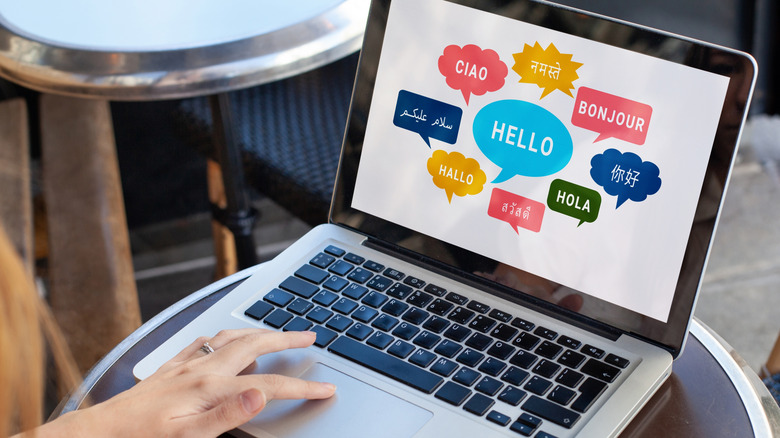Rick Steves' Best Tips For Overcoming A Language Barrier Are Pure Genius
Travel writer Rick Steves gives all kinds of travel advice, including clever ATM tricks to withdraw money as a tourist in Europe and the best ways to travel solo without feeling lonely. As a professional international traveler, he also knows how to overcome language barriers. A working knowledge of English is a great asset for travelers, as it'll help you navigate airports, hotels, restaurants, and attractions. This is especially true in Europe, where many countries have high or very high levels of English. Still, this does not mean that native speakers can expect to use slang and colloquialisms like they would at home — especially in tourist favorites such as Spain, Italy, and France, whose citizens have only moderate English proficiency.
English is still common in these popular locations, but you will likely encounter language barriers at some point. Even in nations with very high proficiency, like the Netherlands, Austria, Croatia, and Denmark, you may need to rely on gestures to communicate. Language barriers are not necessarily a problem, though. Steves suggests speaking clearly, using internationally recognized words instead of colloquial slang, and keeping it simple in multicultural communication scenarios. Knowing key phrases in different languages can also help, and the locals might find it endearing. If all else fails, you can always turn to Google Translate.
Rick Steves says to simplify your communication
On his website, Rick Steves urges tourists to speak clearly and pronounce every part of a word as if they were reading an English textbook, which is what many Europeans have used to learn the language. Bear in mind that Europeans have likely learned British English, so words like "holiday" will be better understood than "vacation," and "toilet" is more recognized than "restroom" or "bathroom."
Be mindful of your speech habits and cut out any words or phrases that may be obscure. It may be best to avoid irony, which could mislead or even offend some people. For example, if someone tells you an unusual anecdote, it is common to respond with a surprised "Really?" However, those who aren't familiar with the non-literal uses of a word might think you are questioning their validity. If the speaker has a high level of English, you can explain the miscommunication, but sometimes, you may hit a dead end.
When you run into communication troubles, avoid adding unnecessary words and saying the same thing only louder. Instead, Steves recommends reducing the language to the simplest of utterances but in a clear, friendly way that doesn't patronize people. For instance, "Photo?" is likely more effective than "Can you take my photo, please?" Even if you're visiting the most overtouristed places in Europe, these conversational tips will help make your trip run a lot smoother.

